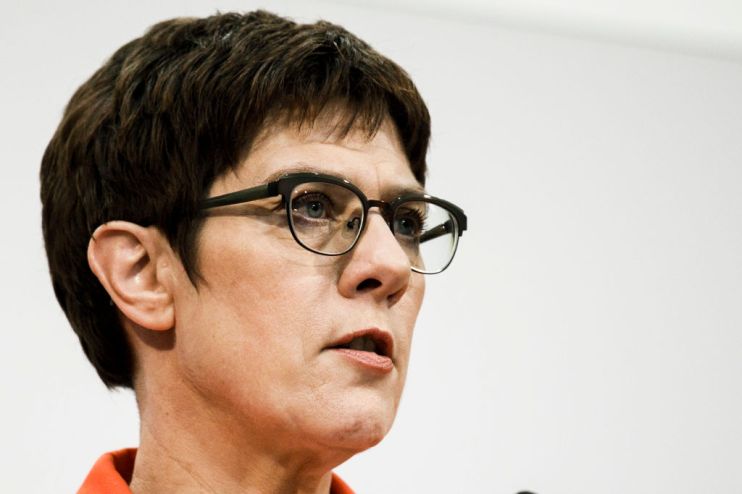Angela Merkel successor Annegret Kramp-Karrenbauer to resign

Angela Merkel’s anointed heir Annegret Kramp-Karrenbauer will not run for the German chancellorship at next year’s election and will step down as leader of the Christian Democratic Union (CDU) party.
Kramp-Karrenbauer, known commonly as AKK, was elected as leader of the centre-right party in 2018 and was expected to run for high office when Merkel steps down at next year’s federal election.
However, German media are reporting this morning that the 57-year-old will resign as CDU leader amidst an ongoing row within her party over whether to cooperate with right-wing anti-immigration party Alternative für Deutschland (AfD).
Politicians from the CDU’s Thuringia branch voted with the AfD last week to oust the state’s premier, defying orders from the party leadership.
Many label AfD as being on the far-right, with the party’s Thuringia leader Björn Höcke designated as a fascist by a German court.
Merkel said it was “unforgivable” that the CDU sided with the AfD and that the result “has to be reverted”.
Kramp-Karrenbauer’s inability to stop CDU representatives from teaming up with the AfD was seen as a shot to her leadership and a potential signal that she could not control the wider party.
The CDU leader was hand picked by Merkel to be her successor as party leader and easily beat out competitors in the 2018 leadership race.
However, she has been criticised in her short tenure for several gaffes, including a joke about gender neutral bathrooms shortly after being elected as leader.
She made fun of the “latte macchiato delegation” in Berlin that had”installed third-gender bathrooms”.
The comment sparked outrage from LGBTQI groups.
Last year, she raised eyebrows after suggesting that online opinions should potentially face regulation, drawing accusations of future censorship if she were to become chancellor.
Emily Mansfield, principal European economist at the The Economist Intelligence Unit, said her resignation was not a complete surprise.
“She has been battling poor approval ratings for months and has signally failed to unite the party’s centrist and conservative wings,” she said.
“Front-runners to replace her include Armin Laschet, Jens Spahn and Friedrich Merz, with Markus Söder and Daniel Günther also possibilities.
“However, they will all face the same problem: how to reconcile differences between the state-level and federal-level positions of the party, and how to balance tough competition from the AfD (especially in east Germany) with the fact that the CDU’s next coalition partner is most likely to be The Greens.”